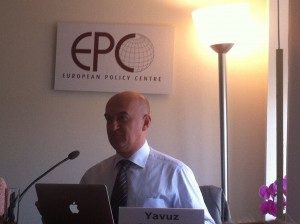In May 15, 2014 EPN participated in the Turkish Insights Policy Dialogue, “Media freedom in Turkey Under pressure but continuing to fight back”. The meeting was organised by the European Policy Centre (EPC) and the Turkish Confederation of Businessmen and Industrialists (TUSKON) as a response to the recent events that affected Turkey in terms of media freedom. Several panelists were present to address the issue of media freedom in Turkey: Yavuz Baydar, columnist at Today’s Zaman, Renate Schoeder, Director of the European Federation of Journalists, H.E. Torbjørn Frøysnes, Head of the Liaison Office at the Council of Europe andThomas Grunert, Head of Unit – Enlargement and European Economic Area, European Parliament. Amanda Paul, Policy Analyst and Programme Executive at the European Policy Centre introduced the topic by exposing Freedom House Index ranking according to which Turkey has been downgraded from a partially free media to no free media at all, positioning itself below Iraq.
 Yavuz Baydar, Columnist at Today’s Zaman opened the debate by developing four points: law, judiciary, ownership and job conditions in Turkey. In terms of law, between 25 and 30 articles restrict press/media freedom. However, some changes have been made regarding the anti-terror law, which have led to positive changes. The judiciary is also facing a number of problems, particularly regarding the Prime Minister. In fact, around 17 people were sentenced for labeling the Prime Minister, showing the existing pressure of expressing one’s opinion in Turkey. The ownership issue led to protests against self-censorship and the media order in Turkey. In terms of job conditions, Mr Baydar explained that those who insisted in being part of a trade union were fired or worked under threatful conditions. Consequently, it creates a fear of being fired arbitrary and risking not being rehired. “It turns newsroom into open-air prisons, you can’t take editorial decisions out of fear”, he said.
Yavuz Baydar, Columnist at Today’s Zaman opened the debate by developing four points: law, judiciary, ownership and job conditions in Turkey. In terms of law, between 25 and 30 articles restrict press/media freedom. However, some changes have been made regarding the anti-terror law, which have led to positive changes. The judiciary is also facing a number of problems, particularly regarding the Prime Minister. In fact, around 17 people were sentenced for labeling the Prime Minister, showing the existing pressure of expressing one’s opinion in Turkey. The ownership issue led to protests against self-censorship and the media order in Turkey. In terms of job conditions, Mr Baydar explained that those who insisted in being part of a trade union were fired or worked under threatful conditions. Consequently, it creates a fear of being fired arbitrary and risking not being rehired. “It turns newsroom into open-air prisons, you can’t take editorial decisions out of fear”, he said.
Renate Schoeder, Director of the European Federation of Journalists provided some information about the  organisation and the work undertaken regarding the journalist free campaigns. Ms Schoeder underlined two important facts: first of all, releases are always made pending trials. Second of all, 25 journalists are still in prisons, and some of them have health problems, meaning a lot still has to be done. Nevertheless, some progress has been made. The detention period, for example, has been reduced from 10 years to 5 years.
organisation and the work undertaken regarding the journalist free campaigns. Ms Schoeder underlined two important facts: first of all, releases are always made pending trials. Second of all, 25 journalists are still in prisons, and some of them have health problems, meaning a lot still has to be done. Nevertheless, some progress has been made. The detention period, for example, has been reduced from 10 years to 5 years.
 Thomas Grunert, Head of Unit – Enlargement and European Economic Area, European Parliament elaborated several key points. In his view, a positive tendency can be observed in relation to journalists, meaning that less and less journalists are imprisoned. Mr Grunert also added comments to several topics previously brought up by the panelists, such as the selective reporting of public media, self-censorship, legal provisions, the monopolisation of the media, freedom of speech and the protection of the state.
Thomas Grunert, Head of Unit – Enlargement and European Economic Area, European Parliament elaborated several key points. In his view, a positive tendency can be observed in relation to journalists, meaning that less and less journalists are imprisoned. Mr Grunert also added comments to several topics previously brought up by the panelists, such as the selective reporting of public media, self-censorship, legal provisions, the monopolisation of the media, freedom of speech and the protection of the state.
H.E. Torbjørn Frøysnes, Head of the Liaison Office at the Council of Europe  highlighted various aspects of the EU-Turkish relations as well as Turkey’s role in shaping the standards for Europe and influencing its political face. He also addressed the issue of media freedom and cooperation projects which have been carried out to improve it.
highlighted various aspects of the EU-Turkish relations as well as Turkey’s role in shaping the standards for Europe and influencing its political face. He also addressed the issue of media freedom and cooperation projects which have been carried out to improve it.
To conclude, EPN followed the meeting with great interest. Media freedom is a value which is worth fighting for and it is important to organise such events in order to remain informed of current events and journalists’ day to day battle for media freedom.

